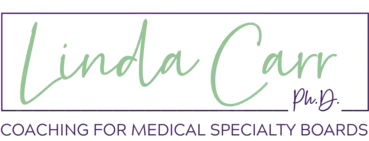
Like hundreds of other physicians, you may still feel the weight of failure from not passing previous board exams. This feeling can deflate your ego, make you question your ability to achieve this milestone, and suck the energy and motivation out of your board preparation. Today’s piece offers solutions to this issue.
One of my previous physician-clients suffered unease and anxiety whenever she remembered seeing the word “FAILURE” on her board report. Her therapist shared a novel idea with her–to post sheets of paper on her walls (in several places in her home) with the word “PASSED” to reduce the negative impact of seeing the word “failure.”
This strategy echoes the research in marriage and work relationships that show significantly more positive forms of communication are needed to counteract criticism or negative feedback. Interestingly, research has uncovered a numerical relationship—the Gottman ratio of 5:1 (positivity-to-negativity)—that supports this notion. This is worth remembering and applying in our daily lives.
Carol Dweck, a psychologist-researcher at Stanford University, offers another idea—change the word “FAILURE” to a powerful phrase, “NOT YET.” This change in our thinking gives us hope and a chance for growth. She argues that our mindset can determine the course of much of our lives.
For people with fixed mindsets, perfection is essential. However, individuals with a growth mindset believe they can change, and that success is about stretching themselves, learning, and improving. Effort is a positive–it helps you get smarter and increases your abilities.
WATCH Carol Dweck’s Ted Talk here (~10 minutes). Dr. Dweck’s research on a growth mindset among young learners reveals fascinating insights that can be applied to adult medical learners like yourself.
Research confirms that our mindset significantly impacts our learning and memory.
A growth mindset is not about effort, although effort plays an important role. Rather, it is about what individuals believe about their ability to learn. By changing our perspective (or mindset), we can turn past failures into opportunities to learn and grow.
When we face a setback such as failing boards, we need to replace our neurological hardware with “new” thinking–focusing on the present moment, not returning to the failure, which is emotion-laden.
The setback exists in our mind. We keep the hurt alive by continuing to think about it. We need to let it go, because what we think about continues to grow.
Ask yourself, “What is the emotion that I am feeling?” Take six deep breaths. Breathe out through your mouth. This process deactivates the stressful part of the brain and brings you back to the present moment.
In truth, if you shift your mind, you will shift your life–the choice is yours.
________________
Linda L. Carr, Ph.D., Founder/Principal at Coaching for Medical Specialty Boards, is a medical educator and learning specialist who coaches physicians preparing for specialty boards through virtual, one-on-one coaching. Visit www.DrLindaCarr.org to learn more about her program and download her FREE Study Guide.
